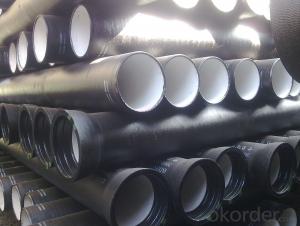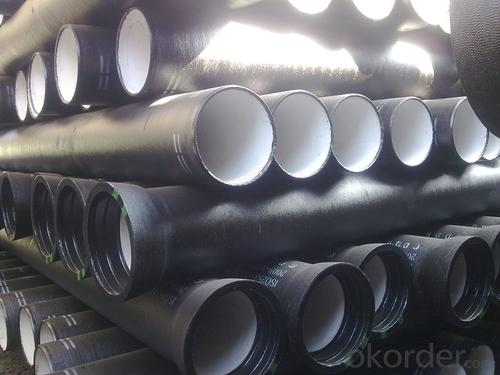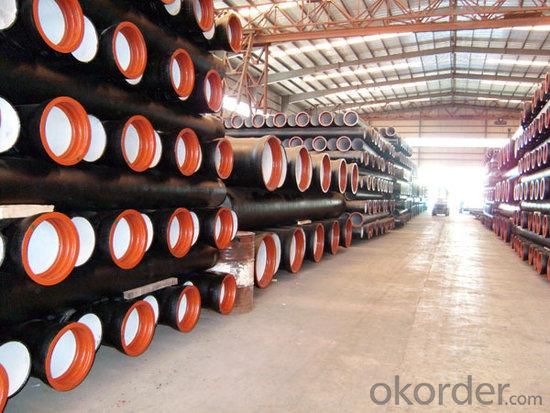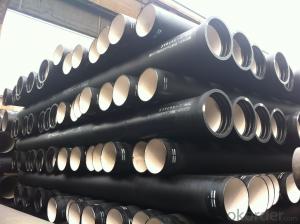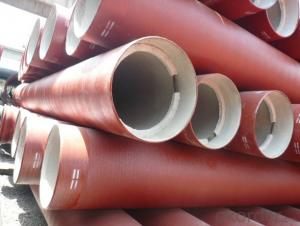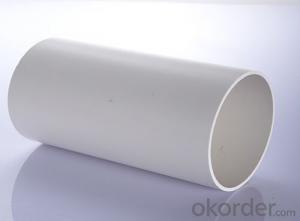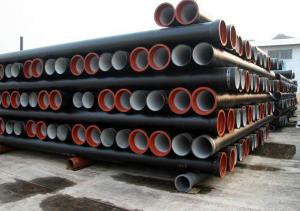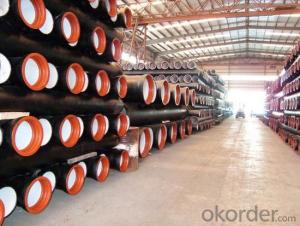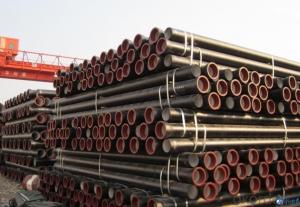Ductile Iron Pipe and Fitting DN100-800 Class30 EN545
- Loading Port:
- China main port
- Payment Terms:
- TT or LC
- Min Order Qty:
- 20 m.t.
- Supply Capability:
- 200000 m.t./month
OKorder Service Pledge
OKorder Financial Service
You Might Also Like
1,Ductile Iron Pipe Description :
1) Pipes confirm to ISO2531,K9 class,T type joint,6m long,with inside cements lining conform to ISO4179, outside Zinc spraying(130g/m2) and bitumen coating(70μm) conform to ISO8179.
2) Pipe ends: Spigot and socket ends, with 100% SBR rubber gaskets accoding to ISO4633
3) we can do third party inspection according to customer's request.
2,Main Features of the Ductile Iron Pipe:
1. Material: Ductile iron grade 500-7/ 450-10 in accordance with ISO1083
2. Standard: ISO 2531, EN545, EN598, ANSI, AWWA
3. Certificate: ISO9001, ISO14001, SGS, NSF, WRAS
4. Test: In accordance with ISO 2531 / EN 545 / EN598 and 100% water pressure test
5. Length: 6m or cut into 5.6m, 5.7m, 5.8m
6. Internal Lining: Cement, conform to ISO4179
7. Rubber: NBR, SBR, EPDM according to ISO4633 / EN681.1
3,Ductile Iron Pipe Images:
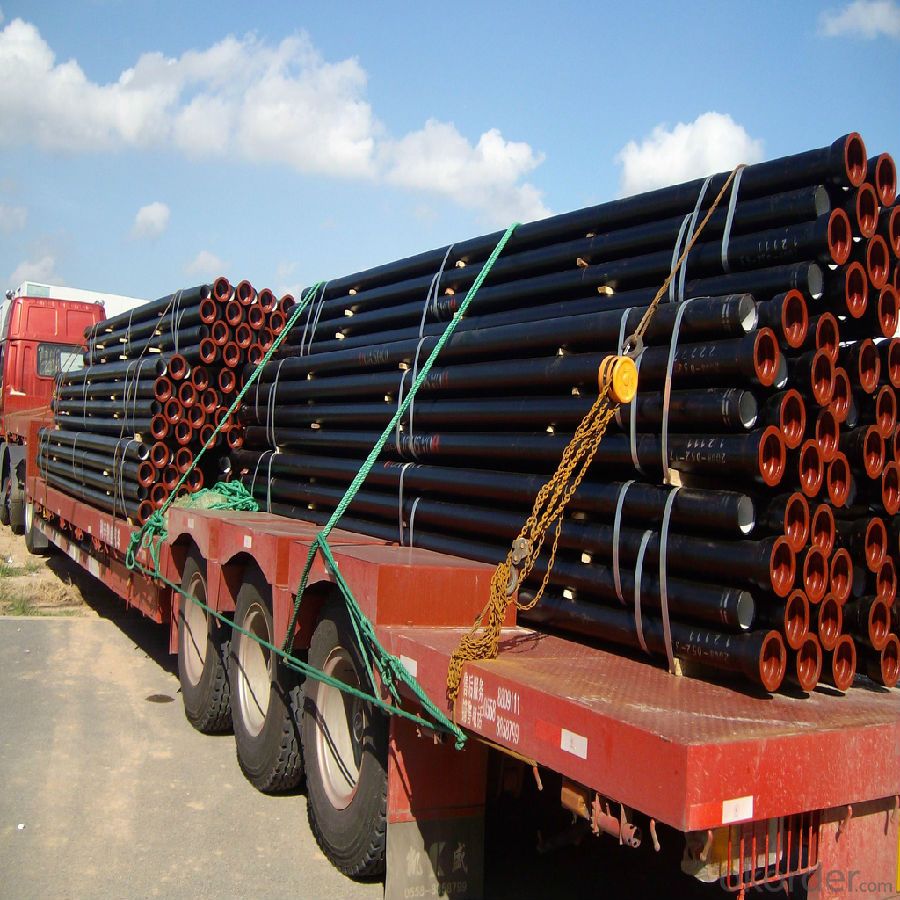
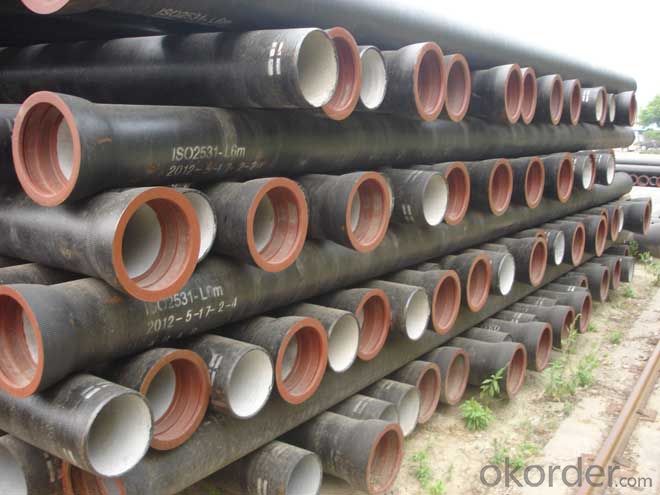
4.Ductile Iron Pipe Specification:
Internal lining: ductile iron pipes shall have an internal cement mortar lining in acc with ISO4179.
External coating: ductile iron pipes shall be externally coated with metallic zinc spray plus a further layer of resin painting to ISO8179.
Gasket: 100% SBR/NBR/EPDM rubber gasket in accordance with ISO4633.
Packing: ductile iron pipes from DN100 to DN300 be bundled with steel belts, others are in bulk.
Payment term: L/C, T/T.
5.FAQ:
We have organized several common questions for our clients,may help you sincerely:
1.Q:Why can you guarantee the inner of pipes can’t be corroded?
A: High alumina cement mortar lining and sulphate-resistant cement mortar lining. These two special linings are applicable to inner anti-corrosion for sewage pipes, improving resistance to erosion of the sewage components.
2.Q: Why would you choose ductile iron pipe rather than other pipe materials?
A:The reasons are obvious for that not only ductile iron pipe possesses the inherent strength and flexibility of ductile iron, combined with proven corrosion protection systems, but also the cost savings can be achieved from design to installation and commissioning.
- Q: Can ductile iron pipe be used for industrial wastewater applications?
- Certainly, industrial wastewater applications can make use of ductile iron pipe. Renowned for its robustness, longevity, and corrosion resistance, ductile iron pipe proves itself suitable for a multitude of purposes, including wastewater systems. Its ability to withstand high pressure and endure demanding conditions renders it perfect for industrial wastewater applications that may involve abrasive or corrosive substances. Furthermore, the installation and maintenance of ductile iron pipe are effortless, resulting in reduced costs and guaranteed long-term dependability. Nevertheless, it remains crucial to carefully scrutinize the unique prerequisites of the wastewater application and seek guidance from professionals to ascertain the most fitting pipe material and design.
- Q: Are ductile iron pipes suitable for installation in areas with high soil compaction and traffic loads?
- Yes, ductile iron pipes are suitable for installation in areas with high soil compaction and traffic loads. Ductile iron pipes have high tensile strength and are highly resistant to external loads, making them ideal for areas with heavy traffic and compacted soil. They are designed to withstand the pressure and stress caused by the movement of heavy vehicles and the weight of the soil above them. Additionally, ductile iron pipes have excellent flexibility, allowing them to absorb and distribute the load more effectively, reducing the risk of damage or failure. Therefore, they are a reliable choice for installation in areas with high soil compaction and traffic loads.
- Q: Are ductile iron pipes resistant to acid mine drainage corrosion?
- Generally, ductile iron pipes are resistant to corrosion caused by acid mine drainage (AMD). Ductile iron is a highly durable material that has been widely used in various industries, including mining and water distribution, because of its excellent ability to resist corrosion. AMD is a significant environmental issue that occurs when water comes into contact with sulfide minerals in mining areas, resulting in the formation of sulfuric acid. This acid can cause damage to various materials, including pipes, and can contaminate water sources. Ductile iron pipes have a protective layer made of cement mortar or epoxy coating, which acts as a barrier between the corrosive AMD and the pipe material. This protective layer prevents direct contact and reduces the likelihood of corrosion. Moreover, ductile iron pipes have a strong resistance to both internal and external corrosion, making them suitable for environments where AMD may be present. They have a proven track record of reliability and longevity, even in harsh conditions, ensuring the integrity of the water distribution system and minimizing the risk of leaks or failures. However, it's important to note that the resistance of ductile iron pipes to AMD corrosion can depend on other factors, such as the specific composition and concentration of the AMD, the duration of exposure, and the temperature. Therefore, it is recommended to seek advice from experts and conduct thorough material testing and analysis to determine the suitability of ductile iron pipes in specific AMD environments.
- Q: What is the expected pressure rating of ductile iron pipes?
- The expected pressure rating of ductile iron pipes can vary depending on various factors such as pipe diameter, wall thickness, and type of joint used for installation. However, generally speaking, ductile iron pipes are known for their high strength and durability, allowing them to withstand high pressure levels. In most cases, ductile iron pipes are designed and manufactured to meet or exceed the requirements of industry standards such as the American Water Works Association (AWWA) C151 or C115/A21.15. These standards specify the minimum pressure rating for ductile iron pipes, which typically range from 150 to 350 psi (pounds per square inch) for water transmission applications. It is important to note that the pressure rating also depends on the class of the pipe, which refers to the thickness of the pipe's wall. Typically, ductile iron pipes are available in different classes such as Class 50, Class 51, Class 52, etc. Each class has its own pressure rating, with higher classes offering greater strength and resistance to pressure. It is recommended to consult the manufacturer's specifications and guidelines for the specific ductile iron pipes being used to determine the exact pressure rating. It is also essential to consider other factors such as pipe support, installation methods, and operating conditions to ensure the safe and efficient operation of the ductile iron pipe system.
- Q: How can the ductile iron pipes be treated with corrosion protection?
- Bituminous paint coatingBituminous paint coatings are pipes used to carry gas. Preheating the pipe before spraying can improve the adhesion of asphalt paint and accelerate drying
- Q: How does ductile iron pipe perform in areas with high ground movement?
- Ductile iron pipe performs well in areas with high ground movement due to its inherent flexibility and strength. Its ability to bend and absorb ground movements makes it less susceptible to cracking or breaking compared to other rigid pipe materials. Additionally, the material's high tensile strength and durability ensure that it can withstand the stresses caused by ground movement without compromising its structural integrity.
- Q: Can ductile iron pipes be repaired if damaged?
- Yes, ductile iron pipes can be repaired if damaged. Various repair methods such as welding, clamping, or using repair couplings can be employed to fix cracks, breaks, or other damages in ductile iron pipes. However, the extent and type of damage will determine the most suitable repair method. It is recommended to consult with professionals or experts in pipe repair to ensure proper and effective repairs.
- Q: Can ductile iron pipe be used for road and highway crossings?
- Ductile iron pipe is indeed suitable for road and highway crossings. This material, known for its strength and durability, is ideal for underground infrastructure projects like road and highway crossings. Its remarkable ability to withstand heavy loads, corrosion, and external forces makes it the perfect choice for enduring the traffic and environmental conditions commonly encountered in road and highway crossings. Moreover, ductile iron pipe comes in different sizes and strengths, offering customization options to meet the specific needs of the crossing. To maximize the longevity and performance of ductile iron pipes in road and highway crossings, it is crucial to follow proper installation techniques and adhere to relevant industry standards.
- Q: How are ductile iron pipes protected against stray current corrosion?
- Ductile iron pipes are protected against stray current corrosion through the implementation of various measures. One common method is the installation of a protective coating, such as an epoxy or zinc coating, on the external surface of the pipes. This coating acts as a barrier, preventing direct contact between the pipe and the surrounding soil or water. Additionally, cathodic protection systems, such as impressed current or sacrificial anode systems, can be employed to further protect the pipes. These systems help to control and redirect stray currents, minimizing their impact on the ductile iron pipes and preventing corrosion.
- Q: Can ductile iron pipes be used for irrigation pivot systems?
- Yes, ductile iron pipes can be used for irrigation pivot systems. Ductile iron pipes are known for their strength, durability, and resistance to corrosion, making them suitable for various applications including irrigation. These pipes can withstand high water pressure and provide a reliable and long-lasting solution for transporting water to irrigation pivot systems. Additionally, ductile iron pipes are also compatible with various fittings and connectors commonly used in irrigation systems, making them easy to install and maintain. Overall, using ductile iron pipes for irrigation pivot systems is a practical choice that ensures efficient water distribution and minimizes the risk of pipe failure.
Send your message to us
Ductile Iron Pipe and Fitting DN100-800 Class30 EN545
- Loading Port:
- China main port
- Payment Terms:
- TT or LC
- Min Order Qty:
- 20 m.t.
- Supply Capability:
- 200000 m.t./month
OKorder Service Pledge
OKorder Financial Service
Similar products
Hot products
Hot Searches
Related keywords
